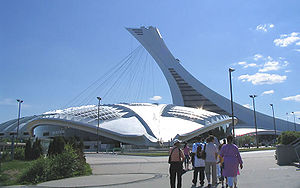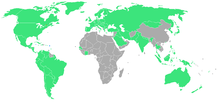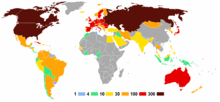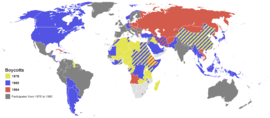- 1976 Summer Olympics
-
Games of the XXI Olympiad 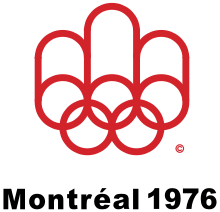
Host city Montreal, Quebec, Canada Nations participating 92 Athletes participating 6,028 (4,781 men, 1,247 women) Events 198 in 21 sports Opening ceremony July 17 Closing ceremony August 1 Officially opened by Elizabeth II, Queen of Canada Athlete's Oath Pierre St.-Jean Judge's Oath Maurice Fauget Olympic Torch Stéphane Préfontaine
Sandra HendersonStadium Olympic Stadium The 1976 Summer Olympics, officially known as the Games of the XXI Olympiad, was an international multi-sport event celebrated in Montreal, Quebec, Canada, in 1976. Montreal was awarded the rights to the 1976 Games on May 12, 1970, at the 69th IOC Session in Amsterdam, over the bids of Moscow and Los Angeles, which later hosted the 1980 and 1984 Summer Olympic Games respectively. These were the first Olympic Games held in Canada, preceding the 1988 Winter Olympics in Calgary and 2010 Winter Olympics in Vancouver.
Contents
Host city selection
Main article: Bids for the 1976 Summer OlympicsThe vote occurred on May 12, 1970, at the 69th IOC Session in Amsterdam, Netherlands. One blank vote was cast in the second and final round.[1] One factor favoring Montreal was that the IOC did not want the Summer games hosted in a superpower for fears of political backlash, which would be proven later on in the Olympic boycotts of 1980 and 1984.[citation needed][2]
1976 Summer Olympics bidding results[2] City Country Round 1 Round 2 Montreal  Canada
Canada25 41 Moscow  Soviet Union
Soviet Union28 28 Los Angeles  United States
United States17 — Organization
Robert Bourassa, then the Premier of Quebec, first pushed Prime Minister Pierre Trudeau to advise Canada's monarch, Elizabeth II, to attend the opening of the games. However, Bourassa later became unsettled about how unpopular the move might be with sovereigntists in the province, annoying Trudeau, who had already made arrangements.[3] The leader of the Parti Québécois at the time, René Lévesque, sent his own letter to Buckingham Palace, asking the Queen to refuse her prime minister's request, though she did not oblige the premier as he was out of his jurisdiction in offering advice to the sovereign.[4]
Highlights
- At age 14, gymnast Nadia Comăneci of Romania scored seven perfect 10.0 and won three gold medals, including the prestigious All-Around. The score board could hold only 3 digits and the score was shown as 1.00. In women's gymnastics three gold medals were also won by Nellie Kim of the Soviet Union. Nikolai Andrianov of the USSR won four gold medals, including All Around, in men's gymnastics.
- Taro Aso was a member of the Japanese shooting team. 32 years later, he would be elected as the prime minister of Japan.
- The Games were opened by Elizabeth II, as head of state of Canada, and several members of the Royal Family attended the opening ceremonies. The Queen's daughter, Princess Anne, competed in the games as part of the British riding team.
- The Olympic Flame was "electronically" transmitted via satellite from Athens to Ottawa, by means of an electronic pulse derived from the actual burning flame. From Ottawa, it was carried by hand to Montreal. After a rainstorm doused the Olympic flame a few days after the games had opened, an official relit the flame using his cigarette lighter. Organizers quickly doused it again and relit it using a backup of the original flame.
- When the Israeli team walked into the stadium at the Opening Ceremonies, their national flag was adorned with a black ribbon in commemoration of the 1972 Munich massacre.
- Women's events were introduced in basketball, handball and rowing.
- Canada, the host country, finished with five silver and six bronze medals. This was the first time that the host country of the Summer Games won no gold medals. This feat had occurred previously only in the Winter Games – 1924 in Chamonix, France and 1928 in St. Moritz, Switzerland. This later occurred at the 1984 Winter Games in Sarajevo, Yugoslavia, and again at the 1988 Winter Olympics in Calgary, Canada. Alexandre Bilodeau won Canada's first gold medal on home soil in the 2010 Winter Olympics in Vancouver as he won the men's moguls event.
- The Republic of China (Taiwan) team withdrew after Canada's Liberal government, under Pierre Elliott Trudeau, informed it that it could not compete under the name "Republic of China". This was done because Canada officially recognized the People's Republic of China. Canada did try to compromise by saying that the people of the Republic of China could retain their national flag and anthem, but they refused. This would lead to 1979's Nagoya Resolution, where the People's Republic and Taiwan agreed that Taiwan would compete in the Olympics and other international sporting events as Chinese Taipei with a custom flag.
- In protest at a tour of South Africa by the New Zealand All Blacks rugby union team early in the year, Congo's official Jean Claude Ganga led a boycott of 28 African nations as the IOC refused to bar the New Zealand team. Some of the nations (including Morocco, Cameroon and Egypt) had already participated, however, as the teams withdrew only after the first day. From Southern and Central Africa, only Senegal and Ivory Coast took part. Both Iraq and Guyana also opted to join the Congolese-led boycott.
- Because of the Munich massacre, security at these games was visible, as it had been earlier in the year at the Winter games in Innsbruck, Austria.
- Viktor Saneyev of the Soviet Union won his third consecutive triple jump gold medal, while Klaus Dibiasi of Italy did the same in the platform diving event.
- Alberto Juantorena of Cuba became the first man to win both the 400 m and 800 m at the same Olympics. Finland's Lasse Virén also achieved a double in the 5000 and 10,000 m and finished 5th in the marathon, thereby failing to equal Emil Zátopek's 1952 achievements.
- Boris Onishchenko, a member of the Soviet Union's modern pentathlon team, was disqualified after it was discovered that he had rigged his épée to register a hit when there wasn't one. Because of this, the USSR modern pentathlon team was disqualified. Onischenko earned the enmity of other Soviet Olympic team members: for example, USSR volleyball team members threatened to throw him out of the hotel's window if they met him. Due to his disqualification, it was suggested that he earned the nickname of "Boris DISonish-chenko".
- Five American boxers – Sugar Ray Leonard, Leon Spinks, Michael Spinks, Leo Randolph and Howard Davis Jr. won gold medals in boxing. This has been often called the greatest Olympic boxing team the United States ever had, and, out of the five American gold medalists in boxing, all but Davis went on to become professional world champions.
- Princess Anne of the United Kingdom was the only female competitor not to have to submit to a sex test[citation needed]. She was a member of her country's equestrian team.
- Japanese gymnast Shun Fujimoto performed on a broken right knee, and helped the Japanese team win the gold medal for the team championship. Fujimoto broke his leg on the floor exercise, and due to the closeness in the overall standings with the USSR, he hid the extent of the injury. With a broken knee, Fujimoto was able to complete his event on the rings, performing a perfect triple somersault dismount, maintaining perfect posture. He scored a 9.7 thus securing gold for Japan. Years later, when asked if he would do it again, he stated bluntly "No, I would not."[5]
- The East German women's swimming team won all but two gold medals.
- The U.S. men's swimming team won all but one gold medal.
- Luann Ryon won the women's Archery gold for the USA; Ryon had never before competed at the international level.
- U.S. track and field athlete Bruce Jenner won the gold medal for decathlon, setting a world record of 8,634 points.
- Alex Oakley, the Canadian race walker, became the oldest track and field athlete to compete at the Olympic Games. He was aged 50, and taking part in his fifth Olympics.
- The New Zealand Black Sticks Men Hockey team beat Australia to win gold, becoming the first non-Asian/European win the gold medal in Hockey.
Venues
Main article: Venues of the 1976 Summer OlympicsMontreal Olympic Park
- Olympic Stadium – Opening/Closing ceremonies, Athletics, Football (final), Equestrian (jumping team final)
- Olympic Pool – Diving, Modern pentathlon (swimming), Swimming, Water polo (final)
- Olympic Velodrome – Cycling (track), Judo
- Montreal Botanical Garden – Athletics (20 km walk), Modern pentathlon (running)
- Maurice Richard Arena – Boxing, Wrestling
- Centre Pierre Charbonneau – Wrestling
- Olympic Village (Montreal) – Athletic residence
Venues in Greater Montreal
- Olympic Basin, Île Notre-Dame – Canoeing, Rowing
- Claude Robillard Centre – Handball, Water polo
- Centre Étienne Desmarteau – Basketball
- St. Michel Arena – Weightlifting
- Paul Sauvé Centre – Volleyball
- Montreal Forum – Basketball (final), Boxing, Gymnastics, Handball, Volleyball
- Mount Royal Park – Cycling (individual road race)
- Quebec Autoroute 40 – Cycling (road team time trial)
- Streets of Montreal – Athletics (marathon)
- Winter Stadium, Université de Montréal – Fencing, Modern pentathlon (fencing)
- Molson Stadium, McGill University – Field hockey
Venues outside Montreal
- Olympic Shooting Range, L'Acadie – Modern pentathlon (shooting), Shooting
- Olympic Archery Field, Joliette – Archery
- Olympic Equestrian Centre, Bromont – Equestrian (all but jumping team), Modern pentathlon (riding)
- Pavilion de l'éducation physique et des sports de l'Université Laval, Quebec City, Quebec – Handball preliminaries
- Sherbrooke Stadium, Sherbrooke, Quebec – Football preliminaries
- Sherbrooke Sports Palace, Sherbrooke, Quebec – Handball preliminaries
- Portsmouth Olympic Harbour, Kingston, Ontario – Sailing
- Varsity Stadium, Toronto, Ontario – Football preliminaries
- Lansdowne Park, Ottawa, Ontario – Football preliminaries
Medals awarded
See the medal winners, ordered by sport:
Medal count
These are the top ten nations that won medals at these Games. Host country of Canada placed 27th with 11 medals total. To date, this is the only edition of the Summer Games where the host nation failed to win any gold medal.
Rank Nation Gold Silver Bronze Total 1  Soviet Union
Soviet Union49 41 35 125 2  East Germany
East Germany40 25 25 90 3  United States
United States34 35 25 94 4  West Germany
West Germany10 12 17 39 5  Japan
Japan9 6 10 25 6  Poland
Poland7 6 13 26 7  Bulgaria
Bulgaria6 9 7 22 8  Cuba
Cuba6 4 3 13 9  Romania
Romania4 9 14 27 10  Hungary
Hungary4 5 13 22 27  Canada
Canada0 5 6 11 Participating nations
Three nations made their first Summer Olympic appearance in Montreal: Andorra (which had had his overall Olympic debut a few months before in Innsbruck Winter Olympics), Antigua and Barbuda, Cayman Islands.
Numbers in parentheses indicate the number of athletes from each nation that competed at the Games.
^ WD: Athletes from Cameroon, Egypt, Morocco, and Tunisia competed on July 18–20 before these nations withdrew from the Games.
Boycotting countries
The following 28 countries boycotted the Games.[6] The boycott was due to the refusal of the IOC to ban New Zealand, after the New Zealand national rugby union team had toured South Africa earlier in 1976.[7][8] South Africa had been banned from the Olympics since 1964 due to its apartheid policies.
Zaire did not compete, but claimed financial causes rather than political.[citation needed]
Both the Republic of China and the People's Republic of China boycotted the games over issues concerning the legitimacy of each other. In November 1976, the International Olympic Committee recognized the People's Republic of China as the sole legal representative. In 1979, the IOC began referring to the Republic of China as Chinese Taipei as a result of the Nagoya Resolution; this led to the Republic of China boycotting the 1980 Summer Olympics outside of the US-led boycott that year.[citation needed]
Legacy
The Olympics were a financial disaster for Montreal, as the city faced debts for 30 years after the Games had finished. The Quebec provincial government took over construction when it became evident in 1975 that work had fallen far behind schedule; work was still under way just weeks before the opening date, and the tower was not built. Mayor Jean Drapeau had confidently predicted in 1970 that "the Olympics can no more have a deficit than a man can have a baby", but the debt racked up to a billion dollars that the Quebec government mandated the city pay in full. This would prompt cartoonist Aislin to draw a pregnant Drapeau on the telephone saying, "Allo, Morgentaler?" in reference to a Montreal abortionist.
The Olympic Stadium was designed by French architect Roger Taillibert. It is often nicknamed The Big O as a reference to both its name and to the doughnut-shape of the permanent component of the stadium's roof, though The Big Owe has been used to reference the astronomical cost of the stadium and the 1976 Olympics as a whole. It has never had an effective retractable roof, and the tower was completed only after the Olympics. In December 2006 the stadium's costs were finally paid in full.[9] The total expenditure (including repairs, renovations, construction, interest, and inflation) amounted to C$1.61 billion. Today, despite its huge cost, the stadium is devoid of a major tenant, after the Montreal Expos moved in 2005.
The boycott by African nations over the inclusion of New Zealand, whose rugby team had played in South Africa that year, was a contributing factor in the massive protests and civil disobedience that occurred during the 1981 Springbok Tour of New Zealand. Official sporting contacts between South Africa and New Zealand did not occur again until after the fall of apartheid.
Australia's failure to win a gold medal led the country to create the Australian Institute of Sport.
With Montreal's own Canadiens winning the Stanley Cup the following year, Canada hosting an Olympics has been seen as a good omen to the NHL team in the host city the following year.[10] A year after Calgary hosted the 1988 Winter Olympics, their Flames won the Stanley Cup.[10] The Vancouver Canucks hoped to continue this in the 2011 Stanley Cup Finals, a year after Vancouver hosted the 2010 Winter Olympics.[10][11] However, they ended up losing to the Boston Bruins.[12]
See also
- 1976 Summer Paralympics
- 1976 Winter Paralympics
- 1976 Winter Olympics
- Olympic games celebrated in Canada
- 1976 Summer Olympics – Montreal
- 1988 Winter Olympics – Calgary
- 2010 Winter Olympics – Vancouver
- Olympic games with significant boycotts
- 1976 Summer Olympics – Montreal – African boycott
- 1980 Summer Olympics – Moscow – United States-led boycott
- 1984 Summer Olympics – Los Angeles – Soviet-led boycott
- Summer Olympic Games
- Olympic Games
- International Olympic Committee
- List of IOC country codes
Notes
- ^ [1]
- ^ a b "Past Olympic host city election results". GamesBids. Archived from the original on March 17, 2011. http://www.webcitation.org/5xFvf0ufx. Retrieved March 17, 2011.
- ^ Heinricks, Geoff (2000). Canadian Monarchist News (Toronto: Monarchist League of Canada) Winter/Spring 2000–01. 2001. Archived from the original on September 5, 2007. http://www.monarchist.ca/cmn/2001/opinion.htm. Retrieved July 5, 2009.
- ^ "Politics > Parties & Leaders > René Lévesque's Separatist Fight > René, The Queen and the FLQ". CBC. http://archives.cbc.ca/IDC-1-74-870-5019/people/rene_levesque/clip6. Retrieved July 5, 2009.
- ^ "Fujimoto caps Japanese success", BBC, September 29, 2000
- ^ "Africa and the XXIst Olympiad" (PDF). Olympic Review. IOC. 1976. http://www.la84foundation.org/OlympicInformationCenter/OlympicReview/1976/ore109/ore109h.pdf. Retrieved April 3, 2006.
- ^ "The Montreal Olympics boycott | NZHistory.net.nz, New Zealand history online". Nzhistory.net.nz. http://www.nzhistory.net.nz/media/photo/montreal-olympics-boycott. Retrieved October 21, 2008.
- ^ "BBC ON THIS DAY | 17 | 1976: African countries boycott Olympics". London: News.bbc.co.uk. July 17, 1976. http://news.bbc.co.uk/onthisday/hi/dates/stories/july/17/newsid_3555000/3555450.stm. Retrieved October 21, 2008.
- ^ CBC News (December 19, 2006). "Quebec's Big Owe stadium debt is over". Canadian Broadcasting Corporation. http://www.cbc.ca/canada/montreal/story/2006/12/19/qc-olympicstadium.html. Retrieved October 21, 2008.
- ^ a b c "Olympic history in Canucks' corner". NHL.com. National Hockey League. May 28, 2011. http://www.nhl.com/ice/news.htm?id=564068&navid=mod-rr-headlines. Retrieved May 29, 2011.
- ^ Morris, Jim (April 10, 2011). "Canucks look to re-write playoff history". Canadian Press. Yahoo! Sports. http://sports.yahoo.com/nhl/news?slug=capress-hkn_canucks_playoffs-6525589&print=1. Retrieved April 11, 2011.
- ^ cbc.ca
References
- "Montreal 1976". Olympic.org. International Olympic Committee. http://www.olympic.org/en/content/Olympic-Games/All-Past-Olympic-Games/Summer/Montreal-1976.
- "All the Medallists since 1896". Olympic.org. International Olympic Committee. http://www.olympic.org/en/content/All-Olympic-results-since-1896/?AthleteName=&Games=1333872&Country=&Sport=&TargetResults=true&resultsPageIPP=30.
External links
- "Montreal 1976". Olympic.org. International Olympic Committee. http://www.olympic.org/en/content/Olympic-Games/All-Past-Olympic-Games/Summer/Montreal-1976.
- 1976: African countries boycott Olympics
- Official site by senior members of the Montreal Games Organizing Committee
Preceded by
MunichSummer Olympic Games
Montreal
XXI Olympiad (1976)Succeeded by
MoscowOlympic Games Summer Games Winter Games 1 Discounted ex post facto by the IOC. 2 Cancelled due to World War I. 3 Cancelled due to World War II.Events at the 1976 Summer Olympics (Montreal) Archery • Athletics • Basketball • Boxing • Canoeing • Cycling • Diving • Equestrian • Fencing • Football • Gymnastics • Handball • Hockey • Judo • Modern pentathlon • Rowing • Sailing • Shooting • Swimming • Volleyball • Water polo • Weightlifting • WrestlingVenues of the 1976 Summer Olympics Montreal Olympic Park Greater Montreal Football venues Handball venues Other venues Olympic Archery Field, Joliette · Olympic Equestrian Centre, Bromont · Olympic Shooting Range, L'Acadie · Portsmouth Olympic Harbour (Kingston, Ontario)Olympic Games controversies Boycotts Alternative competitions People's Olympiad (1936) · Games of the New Emerging Forces (1963) · Liberty Bell Classic (1980) · Friendship Games (1984) · Goodwill Games (1986-2001)Events Blood in the Water match (1956) · Tlatelolco massacre (1968) · Black Power salute (1968) · Munich massacre (1972) · Basketball Gold Medal Match controversy (1972) · Kozakiewicz's gesture (1980) · Figure skating scandal (2002) · 2002 Winter Olympic bid scandal (2002) · Underage gymnasts controversy (2008) · Death of Nodar Kumritashvili (2010) · Quadruple jump controversy (2010)History of Montreal Topics Hochelaga · Fort Ville-Marie · Notre-Dame de Montréal · Governor of Montreal · Hôtel-Dieu · Saint-Sulpice Seminary · Battle of Long Sault · Old Montreal · Great Peace of Montreal · Citadel · Grey Nuns · 1732 earthquake · Capitulation of Montreal · American occupation · North West Company · Bank of Montreal · Lachine Canal · List of Mayors · Burning of the Parliament · Gavazzi Riots · Victoria Bridge · Golden Square Mile · Oldest buildings · Ouimetoscope · St. Lawrence Seaway · Expo 67 · Sir George Williams Computer Riot · Murray-Hill riot · October Crisis · Montreal Urban Community · 1976 Summer Olympics · Overdale · Montreal Protocol · École Polytechnique massacre · Montreal merger · Dawson College shooting · National Historic Sites in Montreal
Timeline Pre-European period • 16th Century • 1600s • 1610s • 1620s • 1630s • 1640s • 1650s • 1660s • 1670s • 1680s • 1690s • 1700s • 1710s • 1720s • 1730s • 1740s • 1750s • 1760s • 1770s • 1780s • 1790s • 1800s • 1810s • 1820s • 1830s • 1840s • 1850s • 1860s • 1870s • 1880s • 1890s • 1900s • 1910s • 1920s • 1930s • 1940s • 1950s • 1960s • 1970s • 1980s • 1990s • 2000s Sport in Canada
Sport in CanadaMain articles Sport in Canada • Professional sport in Canada • Baseball in Canada • Canadian football
Cricket in Canada • Rugby league in Canada • Rugby union in Canada • Soccer in Canada • Volleyball in Canada • Canada GamesSignificant figures Canada at the.. Olympics • Summer Olympics • Winter Olympics • Paralympics • Commonwealth Games • Pan Am Games • Special OlympicsSummer Olympics stats Winter Olympics stats Paralympics stats (host nation) Commonwealth Games stats National sports teams A1GP • Australian football • Bandy • Badminton • Baseball • Basketball (men - women) • Cricket (men – women) • Field hockey (men – women) • Floorball (men - men's U-19 - women) • Football • Ice hockey (men – men's U-20 – women • women's U-18) • Ice sledge hockey • Inline hockey • Soccer (men – men's youth – women) • Softball (men - women) • Tennis (Davis Cup - Fed Cup) • Volleyball (men – women) • Water polo (men – women) • Rugby Rugby league • Rugby union (sevens)Ice hockey Football Baseball Other sports Teams... Basketball • Lacrosse • Soccer
Tournaments... Golf • Motorsport • Tennis • Cycle • Soccer • Horse races • CurlingGoverning bodies Sport Canada • Secretary of State (Sport) • Karate Canada • Hockey Canada (Canadian Hockey League) • Equine Canada • Canadian Interuniversity Sport
Baseball Canada • Alpine Canada • Athletics Canada • Canadian Cycling Association • Canadian Lacrosse Association
Skate Canada (governing body) (Speed Skating Canada) • Canadian Soccer Association • Cricket Canada • Canada Rugby LeagueRelated Categories:- 1976 Summer Olympics
- 1976 in multi-sport events
- Sport in Montreal
- Boycotts of events
- Sports festivals in Canada
- History of Canada (1960–1981)
- Olympic Games in Canada
Wikimedia Foundation. 2010.


